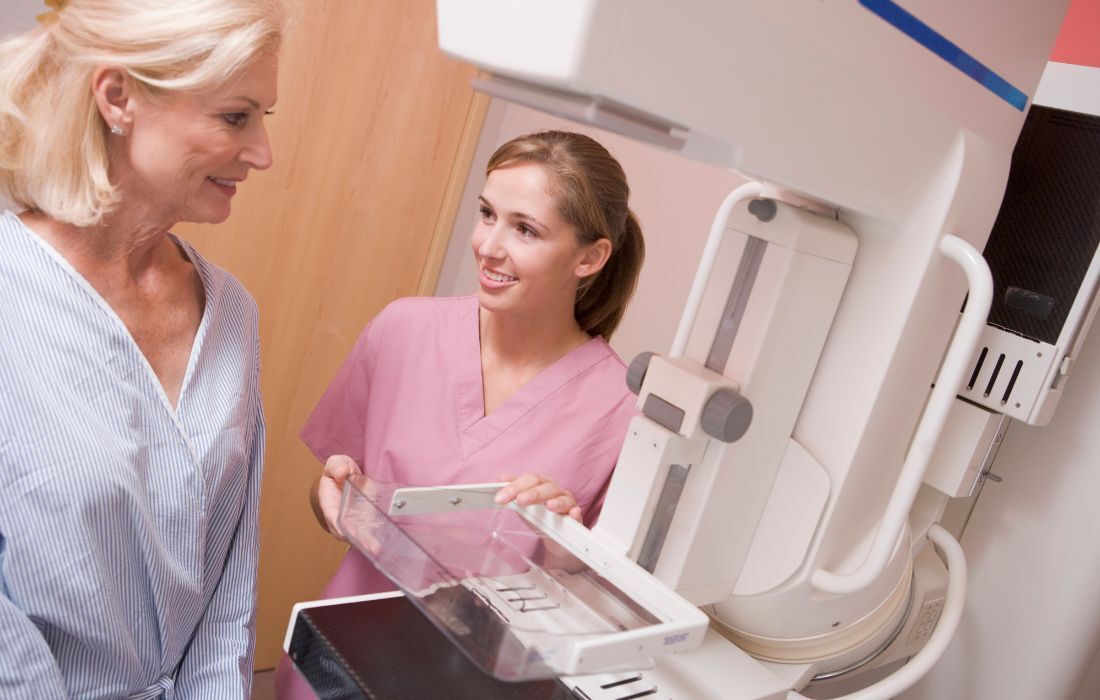September 24, 2024
Breast Cancer Screening: More Than Mammograms

When breast cancer is in the early stages, it typically does not show symptoms. That’s why screening is so important! By finding breast cancer early – before it can be felt – there’s a higher likelihood of a complete recovery.
A mammogram is the standard imaging test used to look for abnormal areas within the breast. This is the most common form of breast cancer screening. However, other types of breast imaging can be used in addition to mammography, especially for women considered at higher risk of developing the disease.
How Your Risk for Developing Breast Cancer Impacts Screening
A woman's breast cancer risk level is typically classified as average or high and is often used to decide when screening should begin. According to the American College of Radiology (ACR) and the Society of Breast Imaging (SBI), it is advisable for all women to undergo a risk assessment at the age of 25 to determine which risk category they fall into.
If you are between 25 and 40 years old and have not yet discussed your breast cancer risk with your gynecologist or primary care physician, consider bringing it up at your next appointment.
Average Risk of Developing Breast Cancer
Average risk means you have no personal history of breast cancer, no strong family history of breast cancer, or no known inherited genetic mutation (BRCA-1 or BRCA-2) correlated with developing breast cancer. The ACR recommends that women of average risk start having annual mammograms at the age of 40 with no upper age limit, as long as the woman is healthy enough to undergo treatments.
High Risk of Developing Breast Cancer
If you have any of the following, you are considered at a higher risk of developing breast cancer:
More than one person in your family had breast cancer
Dense breast tissue
Received chest radiation before the age of 30
Your doctor may have you complete a breast cancer risk questionnaire to identify your lifetime risk. If your results indicate a lifetime risk of 20-25% or greater, you will likely follow a screening plan for those at high risk.
When Should You Start Breast Cancer Screening?
While the typical age to start screening mammograms is age 40, you can start as early as age 25 if you’re in the high-risk category. For those of average risk, the American Cancer Society also recommends you start screening at age 40, with a mammogram every other year until age 44. Starting at age 45 through 54, women should have a mammogram every year. Starting at age 55, you can choose to continue yearly mammograms or switch to every other year.
What Tools Are Used to Screen for Breast Cancer?
While mammograms are the standard, some patients may benefit from additional screening. This includes breast ultrasound and breast MRI.
Mammography for Screening
Mammograms are x-ray images that can detect even small lumps, microcalcifications, or other changes in breast tissue before they can be felt. These changes can be signs of cancer, precancerous cells, or other non-cancerous conditions. Most mammogram imaging today produces digital images rather than film. There are two types of mammograms:
2-Dimensional Mammograms. This type of mammogram creates a 2D image of each breast using two X-ray images of each breast.
Digital Breast Tomosynthesis (3D mammography). This method involves taking a series of breast X-rays from different angles and then creating a 3D image of the breast. The clearer images can reduce the need to repeat the mammogram for many patients.
The American Cancer Society recommends 2D and 3D mammograms for breast cancer screening and advises using the type your doctor recommends. If your mammogram report indicates any abnormality in your breast, further tests will be necessary to determine whether it is cancer or not.
It does not take longer to capture 3D images, however it does require specific technology. Each mammogram facility is different. If you have a preference, ask what is available at the time you book your appointment.
Breast Ultrasound
Breast ultrasound uses sound waves to create images inside the breast. This non-invasive imaging technique can help identify breast changes, such as cysts, that are hard to see on mammograms. It can also determine if a mass is solid or filled with fluid. Ultrasound is not a standard procedure for routine breast cancer screening. However, women with dense breast tissue who have an abnormal area detected on a mammogram may benefit from this as a secondary screening tool.
Breast Magnetic Resonance Imaging (MRI)
A breast MRI is a highly sensitive imaging tool that uses radio waves and magnets to capture images that a mammogram may not be able to detect. MRI provides a different perspective of breast tissue compared to other methods and can identify non-cancerous abnormalities more effectively due to its high sensitivity. Breast MRI is typically used as an additional screening method for high-risk individuals.
An Abnormality Was Detected, Should I Be Worried?
It's important to note that abnormalities detected during breast cancer screening are not always cancerous. Your doctor will recommend additional imaging and possibly a breast biopsy. These next steps make it possible to determine if cancer is present. If it is cancer, it is likely to be at an early stage when breast cancer treatments are most effective.

CCCB Breast Cancer Doctors Encourage Routine Breast Cancer Screening
In addition to regular screening, performing self-exams is a great way to take control of your breast health. You know your breasts best. Becoming familiar with them helps make it easier to detect anything that looks or feels out of the ordinary.
It's also important to talk with your primary care physician or gynecologist about your breast cancer risk level. Your risk level will help them determine the best screening type and when you should start.
The breast cancer doctors at Cancer Care Centers of Brevard offer the latest breast cancer treatments and are here to provide you with an individualized treatment plan. If a breast cancer diagnosis was confirmed through your breast cancer screening and other tests, schedule a consultation with one of our oncologists at a location convenient to you in Palm Bay, Rockledge, Melbourne, and Merritt Island, FL.
Categories: Breast Cancer